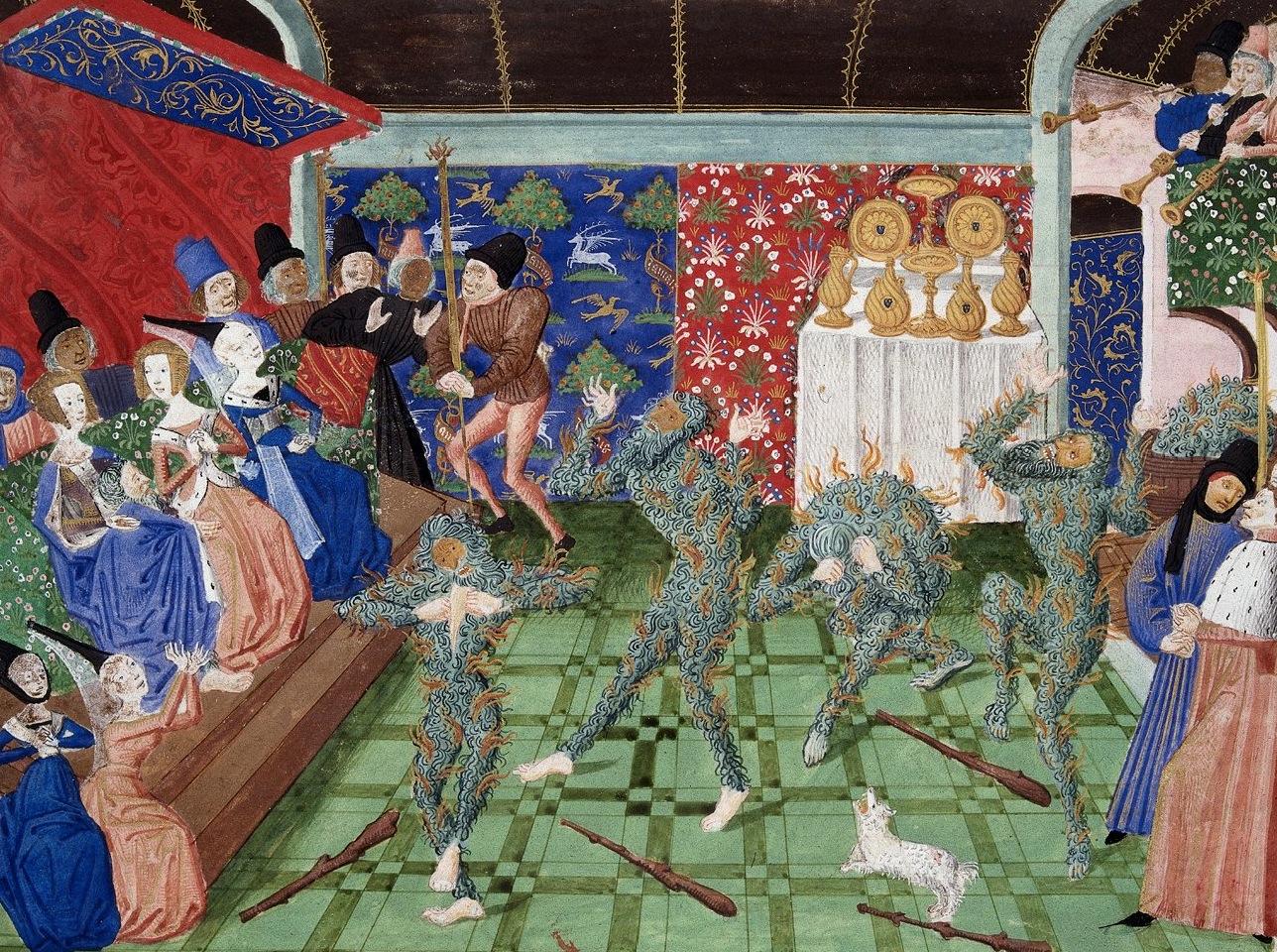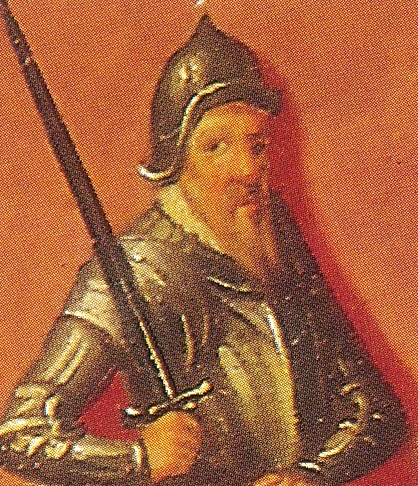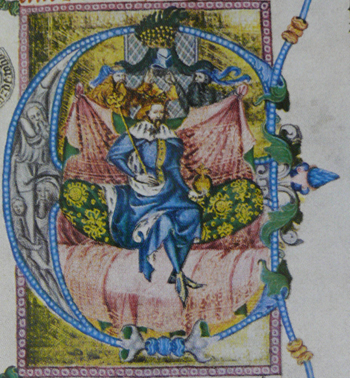|
Frederick, Duke Of Bavaria
Frederick (1339 – 4 December 1393) was Duke of Bavaria from 1375. He was the second son of Stephen II and Elizabeth of Sicily. Reign From 1375 to 1392 he ruled Bavaria-Landshut jointly with his brothers Stephen III and John II and managed to administer the richest part of the duchy, the region of Landshut which he also kept after the division of Bavaria among the brothers in 1392, when Bavaria-Landshut was reduced since Bavaria-Ingolstadt and Bavaria-Munich were created for his brothers. In 1383 Frederick fought on the French side in Flanders against the English. He visited his uncle Albert I of Straubing-Holland in Quesnoy and participated in the siege of Bourbourg. On 1 November he went for an annual pension of 4000 francs in Paris in the service of King Charles VI, whose marriage to his niece Elizabeth he ran significantly. In the summer of 1385 he accompanied Elizabeth - later named Isabeau de Bavaria - to Amiens for her marriage with the King. In 1387 Freder ... [...More Info...] [...Related Items...] OR: [Wikipedia] [Google] [Baidu] |
House Of Wittelsbach
The House of Wittelsbach () is a former Bavarian dynasty, with branches that have ruled over territories including the Electorate of Bavaria, the Electoral Palatinate, the Electorate of Cologne, County of Holland, Holland, County of Zeeland, Zeeland, Sweden (with Finland under Swedish rule, Swedish-ruled Finland), Denmark, Norway, Kingdom of Hungary, Hungary, Kingdom of Bohemia, Bohemia, and Kingdom of Greece, Greece. Their ancestral lands of Bavaria and the Electoral Palatinate, Palatinate were prince-electorates, and the family had three of its members elected emperors and kings of the Holy Roman Empire. They ruled over the Kingdom of Bavaria which was created in 1805 and continued to exist until 1918. The House of Windsor, the reigning royal house of the British monarchy, are descendants of Sophia of Hanover (1630–1714), a Wittelsbach Princess of the Palatinate by birth and List of Hanoverian royal consorts, Electress of Hanover by marriage, who had inherited the success ... [...More Info...] [...Related Items...] OR: [Wikipedia] [Google] [Baidu] |
Charles VI Of France
Charles VI (3 December 136821 October 1422), nicknamed the Beloved () and in the 19th century, the Mad ( or ''le Fou''), was King of France from 1380 until his death in 1422. He is known for his mental illness and psychosis, psychotic episodes that plagued him throughout his life. Charles ascended the throne at age 11, his father Charles V of France, Charles V leaving behind a favorable military situation, marked by the reconquest of most of the English possessions in France. Charles VI was placed under the regency of his uncles: Philip II, Duke of Burgundy; Louis I, Duke of Anjou; John, Duke of Berry; and Louis II, Duke of Bourbon. He decided in 1388, aged 20, to emancipate himself. In 1392, while leading a military expedition against the Duchy of Brittany, the king had his first attack of delirium, during which he attacked his own men in the forest of Le Mans. A few months later, following the ''Bal des Ardents'' (January 1393) where he narrowly escaped death from burning, Char ... [...More Info...] [...Related Items...] OR: [Wikipedia] [Google] [Baidu] |
Frederick I, Margrave Of Brandenburg
Frederick (Middle High German: ''Friderich'', Standard German: ''Friedrich''; 21 September 1371 – 20 September 1440) was the last Burgrave of Nuremberg from 1397 to 1427 (as Frederick VI), Margrave of Brandenburg-Ansbach from 1398, Margrave of Brandenburg-Kulmbach from 1420, and Elector of Brandenburg (as Frederick I) from 1415 until his death. He became the first member of the House of Hohenzollern to rule the Margraviate of Brandenburg. Biography Frederick was born in Nuremberg, the second-born son of Burgrave Frederick V (1333–1398) and the Wettin princess Elisabeth of Meissen. He entered early into the service of his brother-in-law, the Habsburg duke Albert III of Austria. After Albert's death in 1395, he fought on the side of the Luxembourg king Sigismund of Hungary against invading Ottoman forces. He and his elder brother John, husband of Sigismund's sister Margaret of Bohemia, fought in the 1396 Battle of Nicopolis where they suffered a disastrous def ... [...More Info...] [...Related Items...] OR: [Wikipedia] [Google] [Baidu] |
Ansbach
Ansbach ( , ; ) is a city in the Germany, German state of Bavaria. It is the capital of the Regierungsbezirk, administrative region of Mittelfranken, Middle Franconia. Ansbach is southwest of Nuremberg and north of Munich, on the river Fränkische Rezat, a tributary of the river Main (river), Main. In 2020, its population was 41,681. Developed in the 8th century as a Benedictine monastery, it became the seat of the House of Hohenzollern, Hohenzollern family in 1331. In 1460, the Margraves of Fürst und Markgraf von Ansbach, Brandenburg-Ansbach lived here. The city has a castle known as Markgrafenschloß, Margrafen–Schloss, built between 1704 and 1738. It was not badly damaged during the World Wars and hence retains its original historical baroque sheen. Ansbach is now home to a US military base and to the Ansbach University of Applied Sciences. The city has connections via autobahn Bundesautobahn 6, A6 and highways Bundesstraße 13, B13 and Bundesstraße 14, B14. Ansbach st ... [...More Info...] [...Related Items...] OR: [Wikipedia] [Google] [Baidu] |
Beatrice Regina Della Scala
Beatrice ''Regina'' della Scala (1331 – 18 June 1384) was Lady of Milan by marriage to Bernabò Visconti, Lord of Milan, and politically active as the adviser of her spouse. Life Beatrice Regina was the youngest child of Mastino II della Scala and Taddea Carraresi family, da Carrara. She had three older brothers and one sister, as well as five illegitimate half-siblings. Her father, who was a member of the Scaliger family of Northern Italy, was Lord of Verona, Vicenza, Brescia, Parma, and Lucca. Her paternal grandparents were Alboino I della Scala and Beatrice, daughter of Gilberto III da Correggio of Parma, and her maternal grandparents were Jacopo I da Carrara and Anna Gradenigo, daughter of Pietro Gradenigo, Doge of Venice and Morosini Family, Tommasina Morosini. Beatrice’s mother, Taddea, had been married off to Mastino as a way to keep peace between the da Carraras and the della Scala families but this failed thus Beatrice grew up within a milieu of martial conflic ... [...More Info...] [...Related Items...] OR: [Wikipedia] [Google] [Baidu] |
Bernabò Visconti
Bernabò or Barnabò Visconti (1323 – 19 December 1385) was an Italian soldier and statesman who was Lord of Milan. Along with his brothers Matteo and Galeazzo II, he inherited the lordship of Milan from his uncle Giovanni. Later in 1355, he and Galeazzo II were rumoured to have murdered their brother Matteo since he endangered the regime. When Galeazzo II died, he shared Milan's lordship with his nephew Gian Galeazzo. Bernabò was a ruthless despot toward his subjects and did not hesitate to face emperors and popes, including Pope Urban V. The conflict with the Church caused him several excommunications. On 6 May 1385, his nephew Gian Galeazzo deposed him. Imprisoned in his castle, Trezzo sull'Adda, he died a few months later, presumably from poisoning. Life Bernabò was born in Milan, the son of Stefano Visconti and Valentina (also known as Violante and Valenza) Doria. From his mother he was related to the Dorias and the Fieschis, two of the most powerful families o ... [...More Info...] [...Related Items...] OR: [Wikipedia] [Google] [Baidu] |
Marco Visconti, Lord Of Parma
Marco may refer to: People Given name * Marco (actor) (born 1977), South Korean model and actor Surname * Georg Marco (1863–1923), Romanian chess player of German origin * Jindřich Marco (1921–2000), Czechoslovak photographer and numismatist * Joseph Marco (born 1988), Filipino actor * Kenny Marco (1947–2025), Canadian guitarist. * María del Pilar Sinués de Marco (1835–1893), Spanish writer * Tomás Marco (born 1942), Spanish composer and writer on music Places * Marco, Ceará, Brazil, a municipality * Marco, New Zealand, a locality in the Taranaki Region * Marco, Indiana, United States, an unincorporated town * Marco, Missouri, United States, an unincorporated community * Marco Island, Florida, United States, a city and an island Science and technology * Mars Cube One (MarCO), a pair of small satellites which fly by Mars in 2018 * MARCO, a macrophage receptor protein that in humans is encoded by the MARCO gene * Mid-Atlantic Regional Council on the Ocean ( ... [...More Info...] [...Related Items...] OR: [Wikipedia] [Google] [Baidu] |
Berthold VII Of Neuffen , a name
{{disambiguation, geo ...
Berthold may refer to: * Berthold (name), a Germanic given name and surname * Berthold Type Foundry, former German type foundry * Berthold, North Dakota, a place in the United States See also * Berthod, a surname * Berchtold Berchtold (also Berthold, Bertold, Bertolt) is a Germanic name from the Old High German ''beruht'' ('bright' or 'brightly') and ''waltan'' ('rule over'). The name came into fashion in the German High Middle Ages from about the 11th century. The cog ... [...More Info...] [...Related Items...] OR: [Wikipedia] [Google] [Baidu] |
Kingdom Of Bohemia
The Kingdom of Bohemia (), sometimes referenced in English literature as the Czech Kingdom, was a History of the Czech lands in the High Middle Ages, medieval and History of the Czech lands, early modern monarchy in Central Europe. It was the predecessor state of the modern Czech Republic. The Kingdom of Bohemia was an Imperial State in the Holy Roman Empire. The List of Bohemian monarchs, Bohemian king was a prince-elector of the empire. The kings of Bohemia, besides the region of Bohemia itself, also ruled other Lands of the Bohemian Crown, lands belonging to the Bohemian Crown, which at various times included Moravia, Silesia, Lusatia, and parts of Saxony, Brandenburg, and Bavaria. The kingdom was established by the Přemyslid dynasty in the 12th century by the Duchy of Bohemia, later ruled by the House of Luxembourg, the Jagiellonian dynasty, and from 1526 the House of Habsburg and its successor, the House of Habsburg-Lorraine. Numerous kings of Bohemia were also elected Hol ... [...More Info...] [...Related Items...] OR: [Wikipedia] [Google] [Baidu] |
Wenceslaus, Holy Roman Emperor
Wenceslaus IV (also ''Wenceslas''; ; , nicknamed "the Idle"; 26 February 136116 August 1419), also known as Wenceslaus of Luxembourg, was King of Bohemia from 1378 until his death and King of Germany This is a list of monarchs who ruled over East Francia, and the Kingdom of Germany (), from Treaty of Verdun, the division of the Francia, Frankish Empire in 843 and Dissolution of the Holy Roman Empire, the collapse of the Holy Roman Empire in ... from 1376 until he was deposed in 1400. As he belonged to the House of Luxembourg, he was also Count of Luxembourg, Duke of Luxembourg from 1383 to 1388. Biography Wenceslaus was born in the Free imperial city, Imperial city of Nuremberg, the son of Emperor Charles IV, Holy Roman Emperor, Charles IV by his third wife Anna Svídnická, a scion of the Silesian Piasts, and baptized at St. Sebaldus Church, Nuremberg, St. Sebaldus Church. He was raised by the Prague Archbishops Arnošt of Pardubice and Jan Očko of Vlašim. His f ... [...More Info...] [...Related Items...] OR: [Wikipedia] [Google] [Baidu] |
Swabia
Swabia ; , colloquially ''Schwabenland'' or ''Ländle''; archaic English also Suabia or Svebia is a cultural, historic and linguistic region in southwestern Germany. The name is ultimately derived from the medieval Duchy of Swabia, one of the German stem duchies, representing the historic settlement area of the Germanic tribe alliances named Alemanni and Suebi. This territory would include all of the Alemannic German area, but the modern concept of Swabia is more restricted, due to the collapse of the duchy of Swabia in the thirteenth century. Swabia as understood in modern ethnography roughly coincides with the Swabian Circle of the Holy Roman Empire as it stood during the early modern period, now divided between the states of Bavaria and Baden-Württemberg. Swabians (''Schwaben'', singular ''Schwabe'') are the natives of Swabia and speakers of Swabian German. Their number was estimated at close to 0.8 million by SIL Ethnologue as of 2006, compared to a total popula ... [...More Info...] [...Related Items...] OR: [Wikipedia] [Google] [Baidu] |






